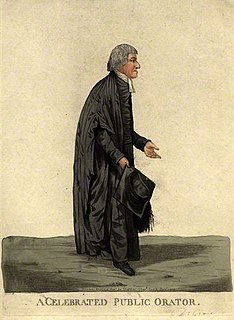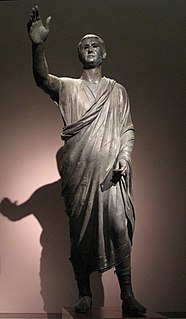
Marcus Tullius Cicero was a Roman statesman, orator, lawyer and philosopher, who served as consul in the year 63 BC. He came from a wealthy municipal family of the Roman equestrian order, and is considered one of Rome's greatest orators and prose stylists.

Demosthenes was a Greek statesman and orator of ancient Athens. His orations constitute a significant expression of contemporary Athenian intellectual prowess and provide an insight into the politics and culture of ancient Greece during the 4th century BC. Demosthenes learned rhetoric by studying the speeches of previous great orators. He delivered his first judicial speeches at the age of 20, in which he argued effectively to gain from his guardians what was left of his inheritance. For a time, Demosthenes made his living as a professional speech-writer (logographer) and a lawyer, writing speeches for use in private legal suits.

Marcus Fabius Quintilianus was a Roman educator and rhetorician from Hispania, widely referred to in medieval schools of rhetoric and in Renaissance writing. In English translation, he is usually referred to as Quintilian, although the alternate spellings of Quintillian and Quinctilian are occasionally seen, the latter in older texts.
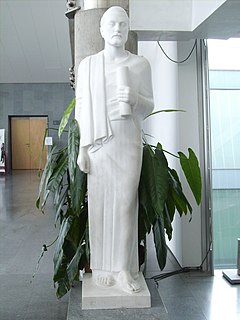
Demetrius of Phalerum was an Athenian orator originally from Phalerum, a student of Theophrastus, and perhaps of Aristotle, and one of the first Peripatetics. Demetrius was a distinguished statesman who was appointed by the Macedonian king, Cassander, to govern Athens, where he ruled as sole ruler for ten years, introducing important reforms of the legal system while maintaining pro-Cassander oligarchic rule. He was exiled by his enemies in 307 BC, and he went first to Thebes, and then, after 297 BC, to the court of Alexandria. He wrote extensively on the subjects of history, rhetoric, and literary criticism. He is not to be confused with his grandson, also called Demetrius of Phaleron, who probably served as regent of Athens between 262 and 255, on behalf of the Macedonian King Antignonos Gonatas.
Titus Albucius was a noted orator of the late Roman Republic.
A philippic is a fiery, damning speech, or tirade, delivered to condemn a particular political actor. The term is most famously associated with two noted orators of the ancient world, the Roman Cicero and, most significantly, Demosthenes of Athens in his movement against the imperialist ambitions of Philip of Macedon. Demosthenes speeches, in 351 BC, denouncing the leader later became known as "The Philippics".
Cicero's Brutus is a history of Roman oratory. It is written in the form of a dialogue, in which Brutus and Atticus ask Cicero to describe the qualities of all the leading Roman orators up to their time. Cicero then attempts to propose a reconstruction of Roman history. Although it is written in the form of a dialogue, the majority of the talking is done by Cicero with occasional intervention by Brutus and Atticus. The work was probably composed in 46 BC, with the purpose of defending Cicero's own oratory. He begins with an introductory section on Greek oratory of the Attic, Asianic, and Rhodian schools, before discussing Roman orators, beginning with Lucius Junius Brutus, "The Liberator", though becoming more specific from the time of Marcus Cornelius Cethegus.
De re publica is a dialogue on Roman politics by Cicero, written in six books between 54 and 51 BC. The work does not survive in a complete state, and large parts are missing. The surviving sections derive from excerpts preserved in later works and from an incomplete palimpsest uncovered in 1819. Cicero uses the work to explain Roman constitutional theory. Written in imitation of Plato’s Republic, it takes the form of a Socratic dialogue in which Scipio Aemilianus takes the role of a wise old man.
Lucius Licinius Crassus, sometimes referred to simply as Crassus Orator, was a Roman consul and statesman. He was considered the greatest orator of his day, most notably by his pupil Cicero. Crassus is also famous as one of the main characters in Cicero's work De Oratore, a dramatic dialogue on the art of oratory set just before Crassus' death in 91 BC.
An opaque context or referentially opaque context is a linguistic context in which it is not always possible to substitute "co-referential" expressions without altering the truth of sentences. The expressions involved are usually grammatically singular terms. So, substitution of co-referential expressions into an opaque context does not always preserve truth. For example, "Lois believes x is a hero" is an opaque context because "Lois believes Superman is a hero" is true while "Lois believes Clark Kent is a hero" is false, even though 'Superman' and 'Clark Kent' are co-referential expressions.
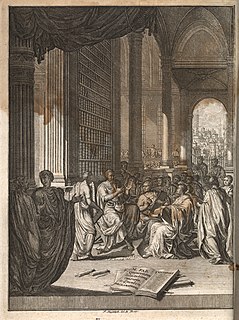
Institutio Oratoria is a twelve-volume textbook on the theory and practice of rhetoric by Roman rhetorician Quintilian. It was published around year 95 CE. The work deals also with the foundational education and development of the orator himself.

The writings of Marcus Tullius Cicero constitute one of the most famous bodies of historical and philosophical work in all of classical antiquity. Cicero, a Roman statesman, lawyer, political theorist, philosopher, and Roman constitutionalist, lived from 106 to 43 BC. He was a Roman senator and consul (chief-magistrate) who played a critical role in the transformation of the Roman Republic into the Roman Empire. A contemporary of Julius Caesar, Cicero is widely considered one of Rome's greatest orators and prose stylists.
De Optimo Genere Oratorum, "On the Best Kind of Orators", is a work from Marcus Tullius Cicero written in 46 BCE between two of his other works, Brutus and the Orator ad M. Brutum. Cicero attempts to explain why his view of oratorical style reflects true Atticism and is better than that of the Roman Atticists "who would confine the orator to the simplicity and artlessness of the early Attic orators."
A Dialogue Concerning Oratorical Partitions is a rhetorical treatise, written by Cicero. According to the method of the Middle Academy, the treatise is sometimes described as a "catechism of rhetoric," for it is presented in the form of questions and answers. Cicero wrote it as a handbook for his young son, Marcus, and structured the text as a dialogue between the two of them.
Marcus Claudius Marcellus was a politician and senator of the Roman Republic. He belonged to the tribus Arnensis. He was the grandson of another Marcus Claudius Marcellus and the father of two later consuls: Marcus Claudius Marcellus, and Gaius Claudius Marcellus. The Claudii Marcelli were a plebeian family, members of the nobiles with a long history of consulships throughout the history of the Republic.
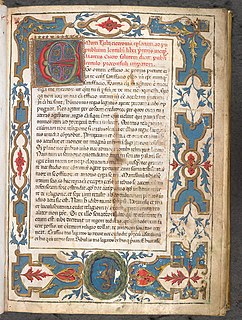
Epistulae ad Familiares is a collection of letters between Roman politician and orator Marcus Tullius Cicero and various public and private figures. The letters in this collection, together with Cicero's other letters, are considered the most reliable sources of information for the period leading up to the fall of the Roman Republic. Traditionally spanning 16 books, and featuring letters from 62 to 43 BCE, the collection was likely first published by Cicero's freedman and personal secretary Marcus Tullius Tiro sometime after Cicero's death in 43 BCE.
The Interpretation of Dreams or Dream-book, written by a certain Antiphon of Athens, is an influential ancient treatise on dreams, of which only a few fragments survive.

